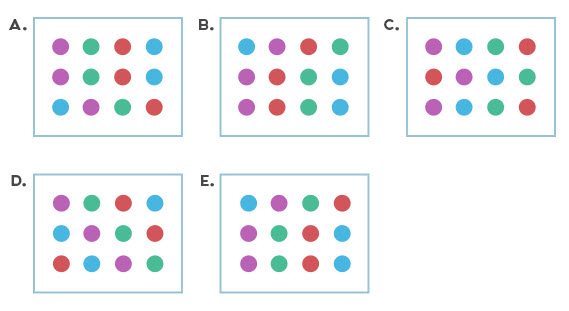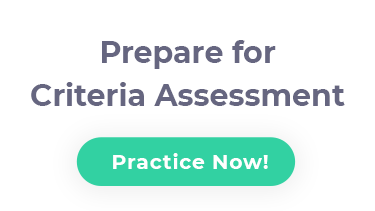The Criteria Cognitive Aptitude Test, otherwise known as the CCAT, is Criteria Corp’s most popular pre-employment exam. Somewhat similar to the Wonderlic, the CCAT is a cognitive ability test. It evaluates your ability to solve problems, acquire new skills, and apply new information.
The questions on the CCAT will test your logical acumen, verbal capacity, and numerical reasoning. Your score will tell your prospective employers a little bit about how much potential you have and what he can expect from you in years to come.
Below, we’ll explain exactly what to expect from this cognitive assessment test and what kind of scores you should aim for. We’ve also got some free CCAT practice questions for you to try! Make sure not to miss those!
What Is the CCAT Test?
The CCAT is a psychometric aptitude test administered online to eager graduates and interested job-seekers. It contains a total of 50 questions, most of which are multiple-choice questions with five possible answers. You’ll be given 15 minutes to answer all of the questions, after which time the computer will close the program and generate an automatic score report.
The time limit is designed to be very restrictive. In fact, very few people finish the entire test. With less than 20 seconds on average to answer each question, you’ll have to move quickly. You’ll need to look for tricks and shortcuts if you’re going to earn a high score.
What Material Is on the CCAT?
The questions on this cognitive aptitude test can be grouped into three broad categories: logic, language, and mathematics.
- Logic
The logic portion of the test asks you to identify and analyze patterns. You’ll be shown a series of shapes and ask you to identify the next figure in the series. You might also be asked to solve riddles and puzzles.
- Language
On these questions, you’ll have to demonstrate that you can articulate your thoughts and communicate with others clearly and fluidly. Typically, the CCAT will provide you with a word and ask you to identify the synonym or antonym. At other times, you’ll be asked to analyze words in context.
- Mathematics
While the CCAT won’t ask you to solve advanced trigonometric equations, it will expect you to know how to manipulate numbers and solve basic word problems. Make sure you know how to handle fractions, proportions, ratios, and percentages.
Why Do I Need to Take the CCAT Exam?
The CCAT might not be a full-proof screening method, but it does help to identify promising candidates, especially in higher level management positions. According to Criteria research, hiring based on a high CCAT cut-off scores can dramatically improve employee retention rates both during the training period and even six months after they’ve begun work.
Employers don’t want to waste funds training unqualified candidates, but unfortunately, interviews and job experience don’t always tell the whole story. Whether or not those individuals are diligent, honest, cooperative, and reliable is another question altogether.
Nonetheless, CCAT research is pretty clear. Their cognitive ability test has been shown to predict professional achievement twice as well as a successful interview.
How to Prepare for CCAT Questions?
The CCAT isn’t your standard vocab quiz. The math portion of the test has a number of challenging problems, and the logic questions are particularly difficult. You’ll want to spend some time reviewing practice problems before exam day if only to familiarize yourself with the kinds of questions on the test.
While each question is unique, many of them are based on the same ideas. If you try enough questions, you’ll eventually start to notice patterns. Perhaps more importantly, some review materials will help put you at ease. With such a severe time limit, you’re bound to feel a bit nervous. If you do a bit of preparation ahead of time, you’ll feel more at ease.
What’s a Good Score on the CCAT Cognitive Exam?
There’s no one good score when it comes to the CCAT. Different employers set different standards, and employers vary their expectations even within one company. You can refer to the average scores listed in the table below to see if you’re on track. Click here to review average scores for various professions.
CCAT Practice Tips
Preparing for the CCAT? Here are some of our best tips!
- Try to use scrap paper as little as possible. Writing takes a lot of time, and on the CCAT, you’re racing against the clock.
- Whenever solving questions with visual patterns, make sure to compare the images both vertically and horizontally.
- Whenever you’re asked about ages, make sure not to make this common mistake. The question will try to trick you by claiming that “Lilah is twice Richard’s age,” for example. However, that does not mean Lilah will always be twice Richard’s age. If Lilah is 22 and Richard is 11, they are and always will be 11 years apart.
Final Thoughts: CCAT
Getting ready to take the CCAT? Don’t sweat it! Take a look at our sample questions and answers first to see how you do, and then switch over to our free CCAT practice test to take a timed version. If you take some time to practice ahead of time, you’ll be more than well prepared when heading out to the assessment center.





